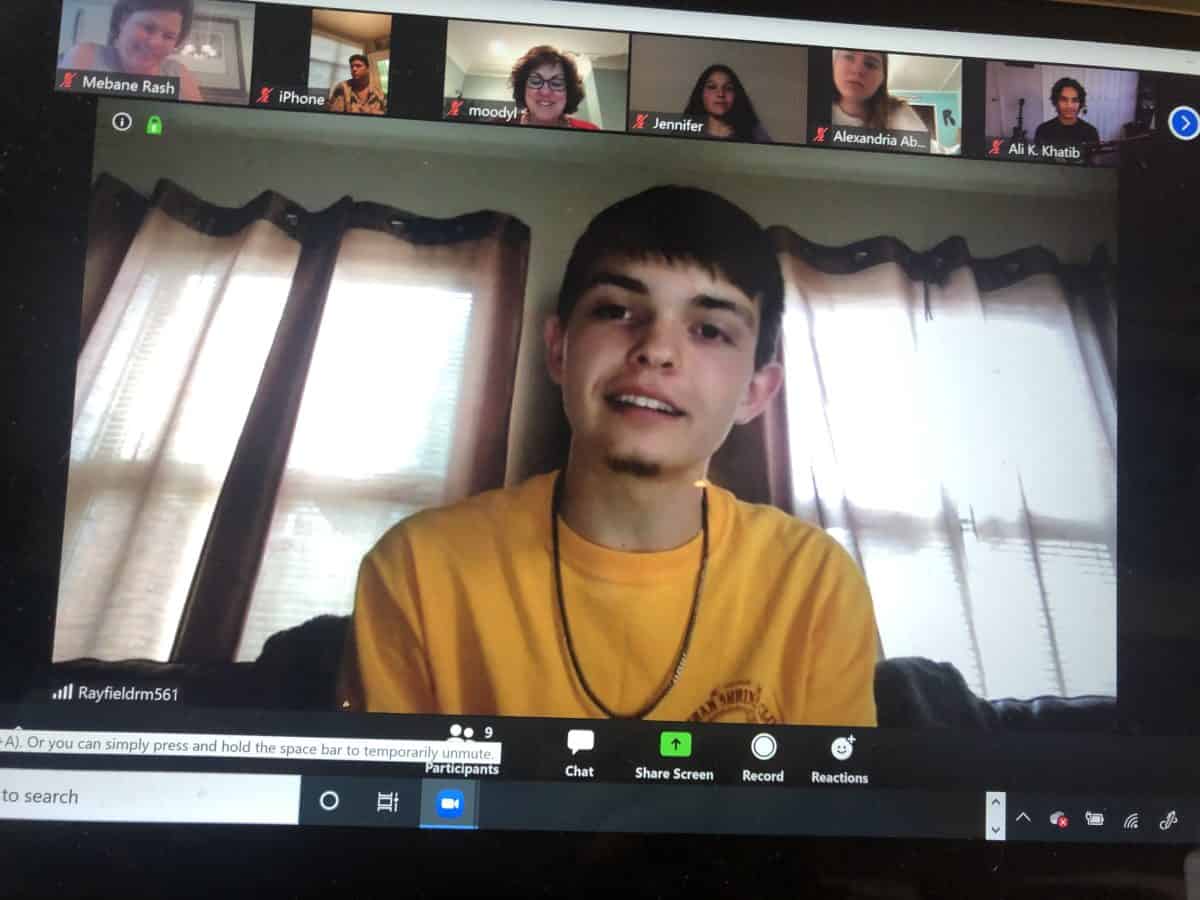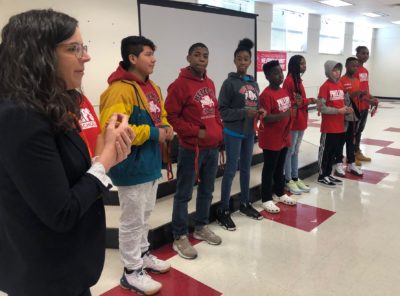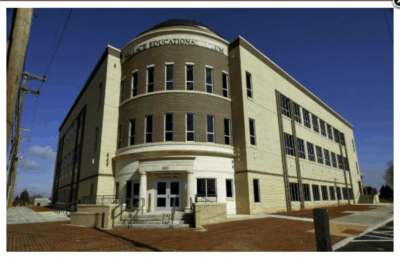

“It would be easy not to see students right now.”
— Dr. Lynn Moody, Superintendent of Rowan-Salisbury School System
A couple of weeks ago, I heard Dr. Lynn Moody tell a story. She was talking about leadership on a national webinar, and she shared the story of one of her students. She said early on in the COVID-19 pandemic, a student emailed her. The student didn’t like school all that much before coronavirus, and he really didn’t like it now.
Turns out, the student was Ryan Rayfield, an 11th grader at Carson High.
Rayfield says, by just the second day of remote learning, “I realized online learning wasn’t for me.” He emailed Moody.
Rayfield had ideas about how to change his experience of school this year — and even more importantly, next year, when students hopefully come back into classrooms. He offered Moody his input.
And amidst this crisis, when superintendents are working around the clock to figure out how to just get through the day, Moody emailed back. They exchanged a series of emails, and Moody invited Rayfield to co-host a conversation on Zoom with students from around the district to talk about student-led, learner-led school redesign.
Yesterday, I joined in on the conversation.
“I really enjoy this opportunity because it’s not very often that we get to voice our opinions.”
— Ali Khatib, 10th grade, Salisbury High
“It’s a way for us to tell somebody who can actually change things our opinions — what we do and don’t like about school.”
— Ali Abbey, 11th grade, Carson High
“This is an opportunity for me to really maximize what I am going to get out of my high school career.”
— Alex Bouk, 9th grade, West Rowan High
Rayfield, who wants to be an electrician, urged Moody to orient classes around real life experiences. He gave her examples.
“How to put down your first mortgage on a house, how to buy a car off the dealer’s lot, how to get a loan from a bank,” he said. “So we know what we are getting into when we are in the real world.”
Khatib picked up from Rayfield, saying, “School is meant to prepare individuals to succeed.” It is meant to be individual, he emphasized. He said students need “a more personalized educational experience.”
That can look like relating concepts to student interests, he said, giving an example. When learning about sinusoidal waves — single-frequency sound waves, I later learned on Google — he suggested that it would be more interesting for students to study them in the context of music.
“A lot of my friends, they go to school just because they kind of have to at this point, and they’re not really getting anything out of it,” said Bouk. That’s why personalized learning — from the classes, to the groupings of students, to tailoring teaching to learning styles — matters, she said. She wants students to be more fulfilled.
Moody listened. She took notes. She reflected back to the students what she was hearing, asking them to clarify. She asked follow up questions.
But mostly, she listened.
Abbey said students enjoy learning when it is hands on. Biology is more interesting, she said, because of the experiments. “Hands on” was a term used by several students, and Abbey explained that hands-on learning is important because then students “are the ones in control.”
One of the students on the call, Jennifer Pleitez, attends an early college, and she and Moody talked about the advantages of smaller class sizes and the ability to focus on school work. They also talked about how to create that experience for every high school student no matter which high school they attended.
Students learn in different ways. Some are visual. Some can hear the information. Others need to figure it out for themselves. Anthony Vaccaro, an 11th grader at East Rowan, lifted up the multiple ways students learn. “I think that’s the way to do it. To be accommodating to all students rather than a certain group,” he said.
Bouk talked about some of the positives of remote learning for students, from self-pacing to connecting one-on-one with teachers. But, she said, too often, if students aren’t in the classroom, they aren’t really seen or heard.
Moody responded, “That’s really scary to me right now. How we are making those connections or lack of those connections? It would be easy not to see students right now.” From the start of COVID-19, Moody has tracked exactly how many students her district can’t locate.
The students didn’t hold back, making it clear that when school is not good for students, it’s really not good.
Abbey said, “School should be a more comfortable environment for students. There are some days I go to school, and it feels more like a prison than a learning environment.”
Moody asked, “Can you describe what’s happening when you feel like it’s a prison?”
Abbey said, “You kind of just feel like you are trapped because you are required to go to school and you are required to do the work but the work feels more like a punishment than you are actually gaining anything out of it.”
In addition to the school environment, student engagement also matters. Abbey continued, “If it’s just a whole bunch of work, it’s just boring, and I don’t want to be a part.” And this is a student who lights up when she is talking about how she likes to learn. Abbey want to be wants to be a forensic entomologist.
Several students talked about the benefits of integrating classes, like math in construction or math in health sciences. Bouk talked about how math is integrated in her horticulture class. She said it was a “hands-on experience that tied into ‘our regulated education.'”
I wrote that phrase down — “regulated education.”
Several students talked about being “piled up with homework,” questioning its purpose and its importance relative to leadership opportunities, sports, theater, and work. But they weren’t opposed to homework as long as it was more personal and purposeful — and less stressful.
“It doesn’t necessarily serve any different purpose than what they assigned in class,” said Kahtib. He noted homework could be used as a tool to engage students in the topics they enjoy.
“There is a lot of learning that goes on outside of school that’s not assigned by school,” acknowledged Moody. “Students that tend to excel have these un-walled or open walled experiences.”
Khatib, who has been in more than 16 productions since he was 8 years old, talked about learning Shakespeare, public speaking, and work ethic in the theater. “Being exposed to stress and knowing how to handle it definitely has helped me a lot in school … and life in general,” he said.
Here is what they want Moody — and the world — to take away.
School could be a place to find yourself and what you want to do.
Schools need to help students learn how to take a “brain break.”
Schools need to break up the routine.
School should be tailored to student’s lives outside the classroom so “our workload doesn’t suffocate us in a way that we can’t get anything out of it.”
Just the learning. Learning is the important thing.
Can we just learn?
It’s teacher appreciation week, and there were a couple of (unplanned) shout outs.
Mr. Mullis, said Courtney Triplett, an 11th grader at South Rowan, teaches contemporary studies. Each student picks a topic, and there is discussion about the topic, but students have the choice to create videos, keynotes, PowerPoints, etc. And then, she said, they are graded on creativity, communication, research, problem solving, and analysis.
“The most I have ever learned is in his class,” she said. “He doesn’t want to box us in. He loves to see the creativity.”
Rayfield lifted up his horticulture teacher, Mr. Burns.
“He does a good job to make things be hands on. He makes the class interesting. He is one of my favorite teachers,” he said.



